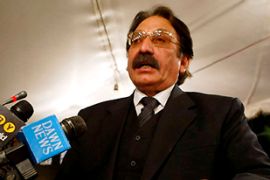Court to rule on missing Pakistanis
Government accused of being complicit in “disappearances” of thousands of citizens.

‘Long battle’
Al Jazeera’s Kamal Hyder, reporting from outside the Supreme Court in the capital, Islamabad, said the attorney-general recommended the court set up a judicial council to look into the issue during the hearing on Thursday.
“That of course will mean that the government is finally agreeing to look deeper into the case,” he said.
| In depth | |||||
|
“There is a possibility that the intelligence agency officers may be asked by the court to come up with a satisfactory answer.
“While the people are pinning their hopes [on this case], it appears that it’s going to be another long battle, at least for the families that have been waiting for so long.”
Among those believed missing is Masood Janjua, a businessman and father of three from the Pakistani city of Rawalpindi, and Faisal Faraz, an engineer from Lahore who disappeared in 2005 while travelling on a bus. Their whereabouts are still unknown.
Rights groups have accused the government of violating its citizens’ rights by holding them in secret and failing to charge them with a crime or put them on trial.
Underground prisons
Robert Fisk, a journalist with the UK-based The Independent newspaper who has been following the case closely, said some of the missing are believed to be being held in secret prisons in Pakistan.
“We know there are 120 underground prisons in Lahore alone,” he told Al Jazeera.
“Others were clearly taken illegally under international law to the US base at Bagram [in Afghanistan], perhaps 750 of them.
“The Supreme Court has ordered – on the record – the closure of police torture centres, so we know that the judges in Islamabad are aware that these centres exist.
“The real issue is how many people are there, when are they going to be released and why are they being held?”
Role of lawyers
Fisk said the government has not shown enough interest in the case, but he said the country’s judiciary and lawyers have championed the cause instead.
“One of the great hopeful signs in this country is the judiciary,” he said.
“Lawyers have become in a sense the political opposition. Lawyers are pushing very hard on the issue of missing people.”
Pakistan’s chief justice, Iftikhar Muhammad Chaudhry, took up the cases of several of the missing before he was deposed by the country’s former president, General Pervez Musharraf, in 2007.
Chaudhry had ordered the country’s security services to produce several of the missing in court.
His supporters accused the government of dismissing him in part because of his interest in the case.
However, the campaign for his reinstatement became a popular cause in Pakistan until he was reinstated under the government of Asif Ali Zardari, the current Pakistani president, in 2009.
